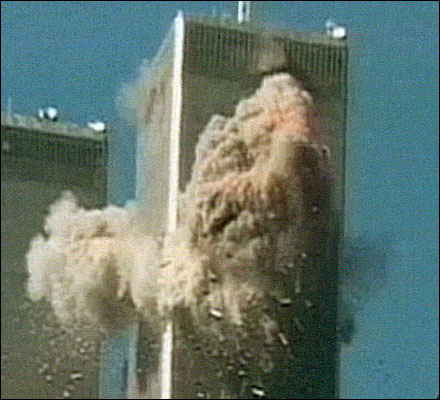 On September 11, 2001, four U.S. planes hijacked by terrorists crashed into the World Trade Center, the Pentagon, and a field in Pennsylvania killing nearly 3,000 people in a matter of hours.
On September 11, 2001, four U.S. planes hijacked by terrorists crashed into the World Trade Center, the Pentagon, and a field in Pennsylvania killing nearly 3,000 people in a matter of hours.
Has it really been that long ago that so many people have forgotten what it was like that day? Why must Americans continue to have the stigma of being the world's most forgetful people? How many people interviewed that day were clamoring for war? The first and foremost duty of any government is to protect the people it represents. It should be plainly obvious that no other country in this world will defend the United States except the United States. We should be so fortunate as to have an administration that will not half-heartedly pursue the terrorists and the countries with governments that support them. This, despite the fickle nature of public opinion. This bowing to public opinion was the problem with the Clinton administration. This is the problem with the Kerry camp.
Because there was no way we could feasibly go after terrorists without going into the countries that harbored them, the administration made a difficult choice. After Afghanistan, invade either Iraq, Iran, or North Korea. Seeing these three choices, it is plain to see why Iraq was chosen. It was the weakest of the three, it harbored terrorists hostile to the US, and it had a population that would most likely support a change of rule. Not only that, a successful operation in Iraq could conceivably change the entire scope of the middle east. A 100% successful outcome wasn't likely, but 80 or 90% could be considered pretty damn good.
War is not predictable. It is foolish to think that there is a cut-and-dry contingency plan for winning a war. There are nine fundamental principles of war that the US military follows. I know this because I teach these skills in my role as a Navy tactical warfare instructor. So you can see why I am justifiably infuriated when politicians who have no idea how to fight a war make incredibly inaccurate assessments about a conflict. The same goes for civilians.
What is important to remember in all this? It's this: Do we as the American people remember why we fight this war against terror? And my answer: Some do not. But at least the critical ones do. What's right isn't always popular...and what's popular isn't always right.
Friday, September 10, 2004
Three Years
Posted by
SixHertz
at
9:08 PM
![]()
Subscribe to:
Comment Feed (RSS)

|